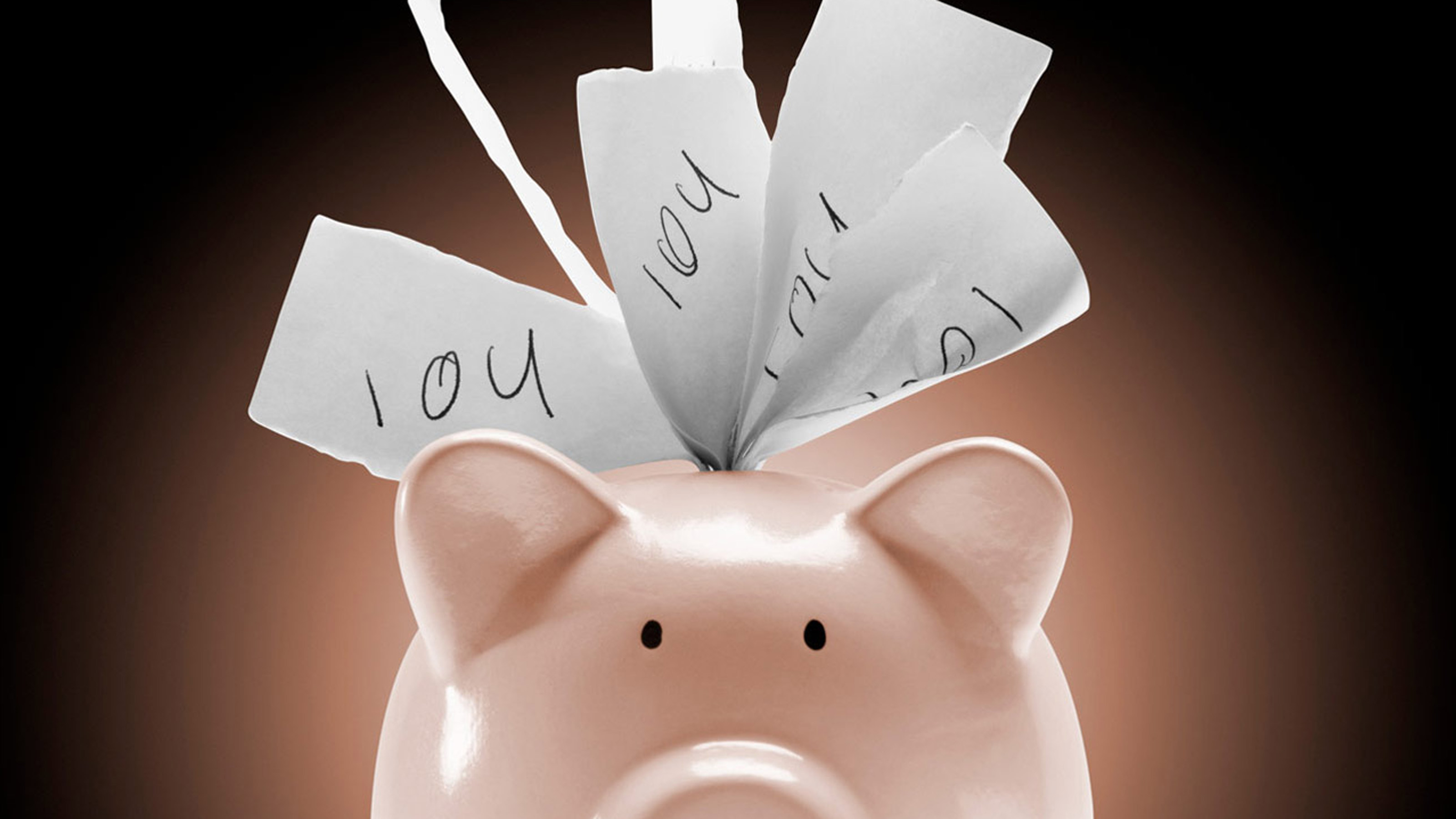7 Money Lies We Tell Ourselves
Everyone does it, one way or another. See if any of these lies sound familiar to you. And find out what kind of damage believing them can do to your finances.


Do you think you’re telling yourself the truth about money? We may think we know the facts about our finances. But our beliefs can often overshadow the facts.
Our wishes, hopes and fears can tip the scales away from the truth. This makes it easier for us to believe what we want to about money — and it can happen without us even realizing it.
The “money lies” we tell ourselves can change the way we think and act when it comes to finances. And since most of us rarely talk about money with our friends and family, the money lies we tell ourselves stick around. That can lock us into destructive beliefs and reinforce poor financial habits.
But no matter what money lies we tell ourselves, it’s never too late to set the record straight. Let’s look at some of the most common money lies we all buy into at some point — and the truth behind them.

1. I'll be happier when I have $_____.
"With $___ in the bank (whatever amount you think is ideal), many of my problems would go away, and I'd be happier."
Does this sound familiar?
Goals and target numbers for earnings, savings and budgets are great. But if you make the mistake of thinking some magic number will flip a happiness switch for you, think again.
When we tell ourselves this money lie, we put too much emotion into a single number. And we may be setting ourselves up for disappointment — both if we never get $__, and if we do get $__ and realize it doesn't make us as happy as we thought it should.
The good news? Studies show that making progress toward our goals can be incredibly satisfying, regardless of whether we hit the target.

2. I deserve it, regardless of whether I can afford it.
"I work hard, and I don't treat myself often."
"I could kick the bucket tomorrow (YOLO)."
"I'm getting a great deal!"
These are just some of the rationalizations we use to convince ourselves that it's OK to buy something.
Whatever legs this money lie stands on, it's usually used to soothe the sting of expensive purchases — those that aren't really essential — and perhaps items we know, deep down, we don't really need.

3. I have strong financial willpower.
When faced with temptation, most of us lie to ourselves that we're great at resisting it. But, when was the last time you chose not to buy something you really wanted? When was the last time you made an impulse buy?
The average American spends at least a couple of hundred dollars a month on impulse purchases.
And we're more likely to buy on impulse and spend more when we're stressed. That's probably why impulse spending shot up about 18% in 2020.
Plus, those of us who are shopping with credit cards are probably spending more on the regular basis than we realize. The average credit card shopper spends about 10% more with their cards than they would with cash. And that's not even counting the cost of interest if the balance isn't paid in full.

4. I'll save more later.
Most folks focus on buying what we need and want now, and we tell ourselves we'll start saving for the future later. If we save anything at all, it's likely to be whatever we have left over. In fact, fewer than 1 in 6 of us are saving more than 15% of our income, and 1 in 5 aren't saving any money.
No matter the reason, when we tell ourselves this money lie and put off saving, we're prioritizing the present over the future.
That can catch up with us on a "rainy day" or whenever we do start thinking seriously about retiring. By that time, there can be a lot of heavy lifting to play "catch up" with our savings — or it may even be too late.

5. I have plenty of time to plan for my financial future (& I don't need to think about it yet).
The future can seem really far away when we're looking 10, 20 or even more years out. When we feel like we have a lot of room between now and then, it's easy to make excuses to not plan or save for it.
This money lie is an excuse for procrastination. It's the rationale we use when we have a hard time managing our negative feelings or uncertainties about our financial futures. And it makes us turn a blind eye to the years of interest that we lose out on when we don't plan.
Benjamin Franklin may have spoken best about the truth behind this money lie when he wisely said, "by failing to prepare, you are preparing to fail."

6. There is good and bad debt.
We tend to assign moral value to debt, thinking of mortgages and student loans as "good" debt, and considering credit card debt as "bad."
This money lie gets us to think the wrong way about debt. All debt comes with some cost, and it's critical to understand how every loan affects our current and future selves.
Instead of focusing on whether debt is "good" or "bad," concentrate on the total cost of the interest over time (it's often higher than you think) and on deciding whether the loan is really helping you achieve your goals.
About half of us seem to already be on track with that thinking, saying that we expect to be out of debt within one to five years.

7. Wanting more is bad.
While I think we can all agree that obsessive greed is wrong, it's not a bad thing to want more for you and your loved ones.
When we tell ourselves we shouldn't want more than we have, we agree to settle for less. And we may be tricking ourselves into thinking it's OK that we're not doing something (or enough) to improve our financial situation.
This money lie holds us back and can make it hard to improve our financial behaviors.
When we frame wanting more as a positive motivator, it can be easier to take the chances or do the work needed to get to that next financial level we may want.

How to Stop Losing Out to Costly Money Lies
How many of these money lies sound like something you’ve told yourself?
At some point, I think we’ve all tricked ourselves with at least one of them. Maybe we were rationalizing a decision, or we were trying to make ourselves feel better about what we wanted to do with our money. And we probably didn’t make the best financial choices as a result.
Here’s the truth: Honesty goes a long way with finances.
What we tell ourselves and what we believe about money influences our financial behaviors. If we’re not telling ourselves the truth, our money lies won’t just drain our wallets. They can affect our financial awareness and inflate our confidence. And they get in the way of maintaining or growing wealth.
When we recognize the money lies that we believe, we can reset our thinking, change our mindset and start taking action. And that sets us up to make better choices and make more progress toward our big financial goals.
P.S.: Sign up for my emails to continue the conversation. My subscribers get my best insights! Just email me at ian.maxwell@revirescowealth.com, and put SUBSCRIBE in the subject field.
This material is for information purposes only and is not intended as an offer or solicitation with respect to the purchase or sale of any security. The content is developed from sources believed to be providing accurate information; no warranty, expressed or implied, is made regarding accuracy, adequacy, completeness, legality, reliability or usefulness of any information. Consult your financial professional before making any investment decision. For illustrative use only.
Investment advisory services offered through Virtue Capital Management, LLC (VCM), a registered investment advisor. VCM and Reviresco Wealth Advisory are independent of each other. For a complete description of investment risks, fees and services, review the Virtue Capital Management firm brochure (ADV Part 2A) which is available from Reviresco Wealth Advisory or by contacting Virtue Capital Management.
Profit and prosper with the best of Kiplinger's advice on investing, taxes, retirement, personal finance and much more. Delivered daily. Enter your email in the box and click Sign Me Up.

Ian Maxwell is an independent fee-based fiduciary financial adviser and founder and CEO of Reviresco Wealth Advisory. He is passionate about improving quality of life for clients and developing innovative solutions that help people reconsider how to best achieve their financial goals. Maxwell is a graduate of Williams College, a former Officer in the USMC and holds his Series 6, Series 63, Series 65, and CA Life Insurance licenses. Investment Advisory Services offered through Retirement Wealth Advisors, (RWA) a Registered Investment Advisor. Reviresco Wealth Advisory and RWA are not affiliated. Investing involves risk including the potential loss of principal. No investment strategy can guarantee a profit or protect against loss in periods of declining values. Opinions expressed are subject to change without notice and are not intended as investment advice or to predict future performance. Past performance does not guarantee future results. Consult your financial professional before making any investment decision.
-
 Stock Market Today: Stocks Slip Ahead of Big Earnings, Inflation Week
Stock Market Today: Stocks Slip Ahead of Big Earnings, Inflation WeekPerhaps uncertainty about tariffs, inflation, interest rates and economic growth can only be answered with earnings.
-
 Ask the Editor — Tax Questions on "The One Big Beautiful Bill Act"
Ask the Editor — Tax Questions on "The One Big Beautiful Bill Act"Ask the Editor In this week's Ask the Editor Q&A, we answer tax questions from readers on the new tax law.
-
 I'm a Financial Planner: Here Are Some Long-Term Care Insurance Tips for Every Age
I'm a Financial Planner: Here Are Some Long-Term Care Insurance Tips for Every AgeStrategies include adding riders to life insurance for younger individuals and considering hybrid or traditional long-term care policies for those in their mid-50s and 60s.
-
 Engineering Reliable Retirement Income in 2025: An Expert Guide
Engineering Reliable Retirement Income in 2025: An Expert GuideFor dependable income, consider using a bucket strategy and annuities in tandem to promote structure, flexibility and peace of mind.
-
 Crazy Markets Shouldn't Derail Your Retirement if You Follow This Financial Pro's Plan
Crazy Markets Shouldn't Derail Your Retirement if You Follow This Financial Pro's PlanBeing nervous about retiring in a volatile market is a red flag that you're relying too heavily on your investment portfolio, rather than a comprehensive plan.
-
 Key to Financial Peace of Mind: Think 'What's Next?' Rather Than 'What If?'
Key to Financial Peace of Mind: Think 'What's Next?' Rather Than 'What If?'Even if you've hit your magic number for retirement, it's hard to stop worrying about money. Giving it a clear purpose is one way to reduce financial anxiety.
-
 Three Estate Planning Documents a Business Owner Can't Afford to Skip
Three Estate Planning Documents a Business Owner Can't Afford to SkipA business owner's estate plan should protect the company and its employees as well as the entrepreneur's heirs. These three documents are critical.
-
 Opportunity Zones: An Expert Guide to the Changes in the One Big Beautiful Bill
Opportunity Zones: An Expert Guide to the Changes in the One Big Beautiful BillThe law makes opportunity zones permanent, creates enhanced tax benefits for rural investments and opens up new strategies for investors to combine community development with significant tax advantages.
-
 Five Ways Retirees Can Keep Perspective Through Market Jitters
Five Ways Retirees Can Keep Perspective Through Market JittersMarket volatility is a recurring event with historical precedents (the dot-com bubble, global financial crisis and pandemic), each followed by recovery. Here's how people who are near or in retirement can navigate economic uncertainty.
-
 I'm a Financial Strategist: This Is the Investment Trap That Keeps Smart Investors on the Sidelines
I'm a Financial Strategist: This Is the Investment Trap That Keeps Smart Investors on the SidelinesForget FOMO. FOGI — Fear of Getting In — is the feeling you need to learn how to manage so you don't miss out on future investment gains.
